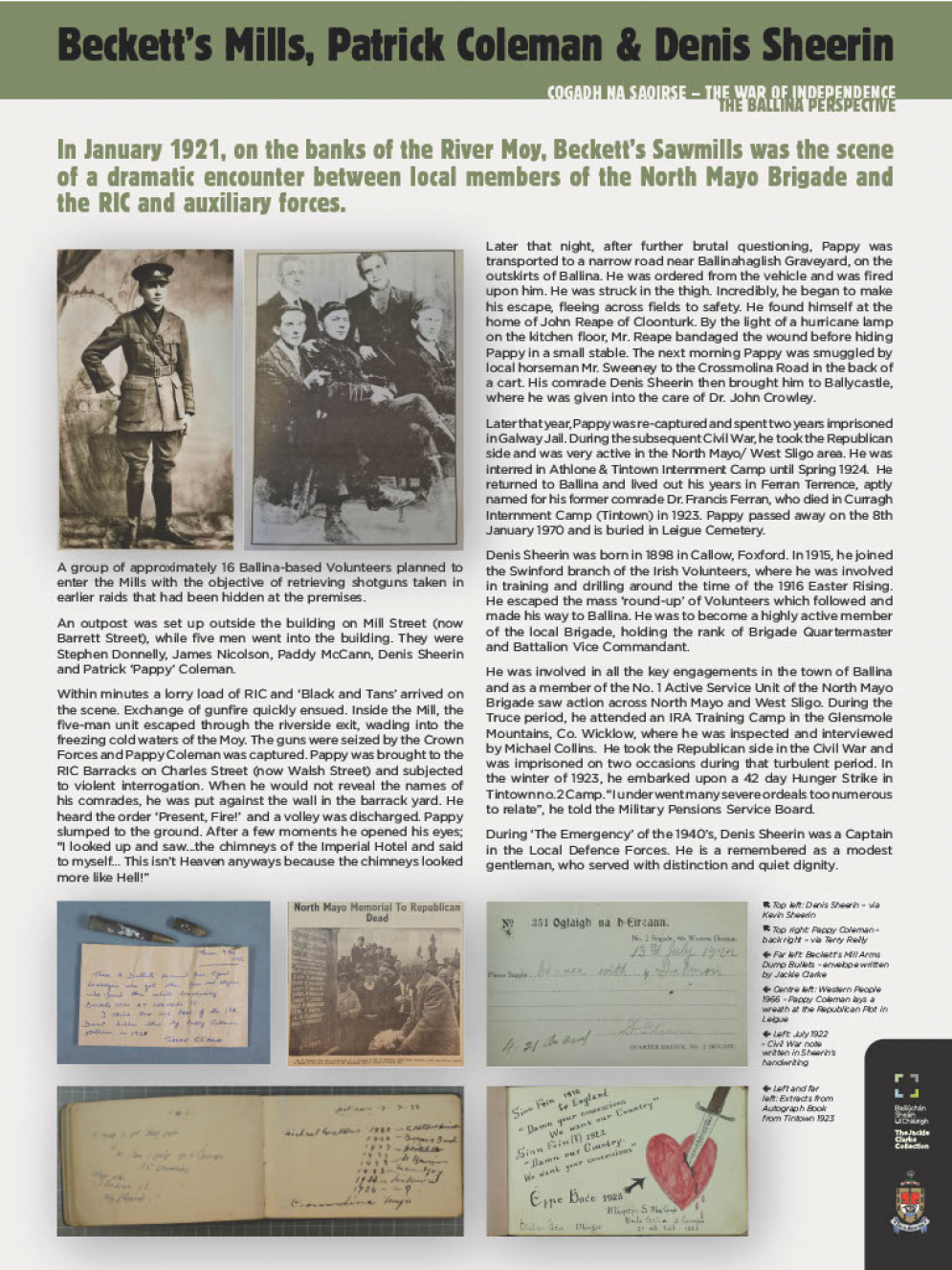In early January 1921, on the banks of the River Moy, Beckett’s Sawmills was the scene of a dramatic encounter between local members of the North Mayo Brigade and the RIC and auxiliary forces.
A group of approximately 16 Ballina-based Volunteers planned to enter the Mills with the objective of retrieving shotguns taken in earlier raids that had been hidden at the premises.
An outpost was set up outside the building on Mill Street (now Barrett Street), while five men went into the building. They were Stephen Donnelly, James Nicolson, Paddy McCann, Dennis Sheerin and Patrick ‘Pappy’ Coleman.
Within minutes a lorry load of RIC and ‘Black and Tans’ arrived on the scene. Exchange of gunfire quickly ensued on Mill Street.
Inside the Mill, the five- man unit were forced to escape through the riverside exit, wading body- deep into the freezing cold waters of the Moy.
The guns were seized by the Crown Forces and Pappy Coleman was captured.
Pappy was brought to the RIC Barracks on Charles Street (now Walsh Street) and subjected to violent interrogation. When he would not reveal the names of his comrades, he was put against the wall in the barrack yard.
He heard the order ‘Present, Fire!’ and a volley was discharged. Pappy slumped to the ground. After a few moments he opened his eyes; “I looked up and saw...the chimneys of the Imperial Hotel and said to myself… This isn’t Heaven anyways because the chimneys looked more like Hell!”
Later that night, after further brutal questioning by an individual thought to be part of the notorious ‘Murder Gang’, Pappy was transported to a narrow road near Ballinahaglish Graveyard, on the outskirts of Ballina.
He was ordered from the vehicle and fire was opened upon him. He was struck in the thigh. Incredibly, he began to make his escape from certain death, fleeing across fields and ditches to safety.
He found himself at the home of John Reape of Cloonturk. By the light of a hurricane lamp on the kitchen floor, Mr. Reape bandaged the wound before hiding Pappy in a small stable, covering him in hay for fear of a raid by the ‘Tans’.
The next morning, with only a good ‘slug of brandy’ to ease the pain, Pappy was smuggled by local horseman Mr. Sweeney to the Crossmolina Road in the back of a cart. There he was met by his comrade Denis Sheerin who brought him to Ballycastle, where he was given into the care of Dr. John Crowley.
Later that year, Pappy was re-captured and spent two years imprisoned in Galway Jail. During the subsequent Civil War, he took the Republican side and was very active in the North Mayo/ West Sligo area. He was interred in Athlone & Tintown Internment Camp until Spring 1924. He returned to Ballina and lived out his years in Ferran Terrence, aptly named for his former comrade Dr. Francis Ferran, who died in Curragh Internment Camp (Tintown) in 1923.
Pappy passed away on the 8th January 1970 and is buried in Leigue Cemetery.
Denis Sheerin was born in 1898 in Callow, Foxford. In 1915, he joined the Swinford branch of the Irish Volunteers, where he was involved in training and drilling around the time of the 1916 Easter Rising. He escaped the mass ‘round-up’ of Volunteers which followed and made his way to Ballina. He was to become a highly active, trusted and prominent and member of the local Brigade, holding the rank of Brigade Quartermaster and Battalion Vice Commandant.
He was involved in all the key engagements in the town of Ballina and as a member of the No. 1 Active Service Unit of the North Mayo Brigade saw action across North Mayo and West Sligo. During the Truce period, he attended an IRA Training Camp in the Glensmole Mountains, Co. Wicklow, where he was inspected and interviewed by Michael Collins. He took the Republican side in the Civil War and was imprisoned on two occasions during that turbulent period. In the winter of 1923, he embarked upon a 42 Hunger Strike in Tintown no.2 Camp. “I underwent many severe ordeals too numerous to relate”, he told the Military Penions Service Board.
During ‘The Emergency’ of the 1940’s, Denis Sheerin was a Captain in the Local Defence Forces. He is a remembered as a modest gentleman, who served with distinction and quiet dignity.



